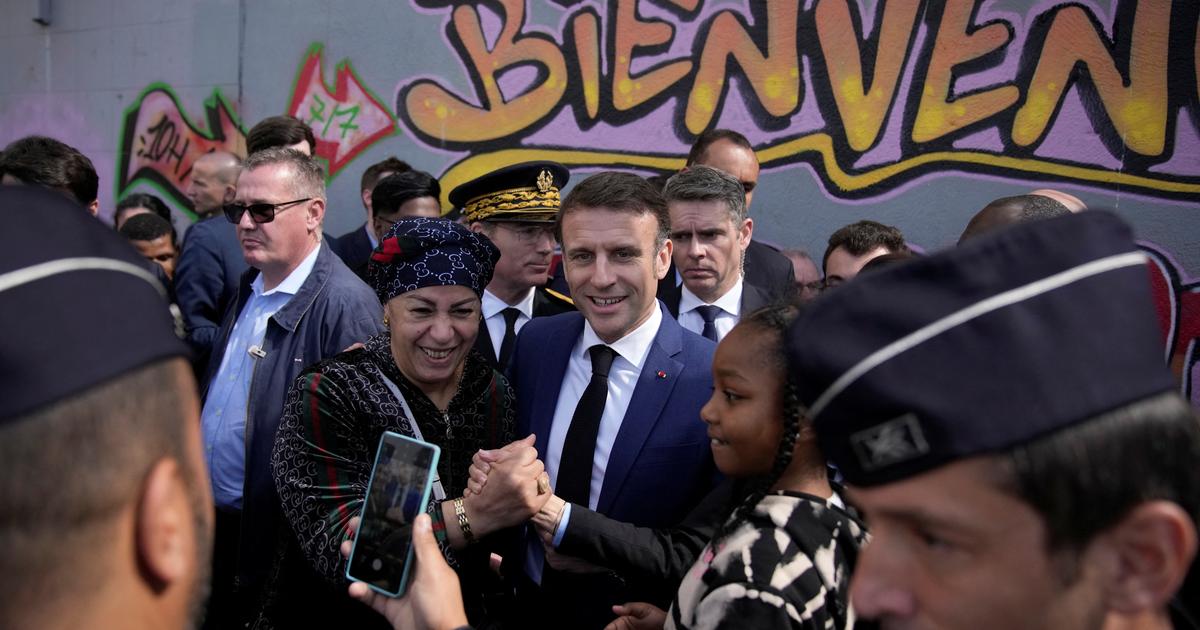Enlarge image
Zarifa Ghafari, 28, is one of the few women who has made it into mayor's office in Afghanistan.
She calls the US negotiations with the Taliban a "shitty deal"
Photo:
Andrea Bruce / NOOR
Fucking deal.
This is how Zarifa Ghafari judged when DER SPIEGEL asked her a year ago what she thought of the peace negotiations between the United States and the Taliban.
Ghafari, 28, is currently Afghanistan's only female mayor.
When she started in 2018, she was 26 years old.
At that time, under US President Donald Trump, it was not yet clear when exactly the US troops would withdraw from the country.
This date has now arrived: September 11, 2021.
There are many reasons to ask Zarifa Ghafari if she is scared.
For example, because she rules a city.
As a woman.
In Afghanistan.
In the 35,000-inhabitant city of Maidan Shar, in a conservative province with many Taliban supporters.
On her first day in office, she had expected a mob of angry men, armed with stones and sticks, they stood in front of Ghafari's office because they did not want to accept a woman with power.
Zarifa Ghafari stayed, but to this day she cannot live in the city that she rules.
Too dangerous.
She lives in Kabul.
Enlarge image
Ghafari cannot live in the city where she rules.
Too dangerous.
Here she can be seen in her apartment in Kabul just before she leaves for work in the morning
Photo:
Andrea Bruce / NOOR
One can also ask the question about their fear because during the telephone interview, muffled fighting between government troops and the Taliban can be heard in the background.
Or because another attack was perpetrated on her that she narrowly escaped.
But Ghafari never gives an answer to the question of fear.
In return, she has a clear stance on the future of Afghanistan.
We can reach them this time via a WhatsApp call.
SPIEGEL:
Ms. Ghafari, what happens when the international troops leave Afghanistan?
Zarifa Ghafari:
They came to build our security, to bring education, to bring other civil society things.
Have invested in our country for 20 years, in security, women's rights, human rights.
So that peace lasts.
Now they go, but the terror is still there.
Why are the troops leaving now of all times?
The Taliban still have ties to al-Qaeda.
Even today they do not respect the rights of women and do not see us as part of society to be taken seriously.
They have problems with women going to school, with working, social engagement, playing a role in politics, in the media, as experts.
Enlarge image
Maidan Shar, Wardak Province: In the city ruled by Ghafari, there are repeated clashes between government troops and the Taliban
Photo:
JIM HUYLEBROEK / NYT / Redux / laif / JIM HUYLEBROEK / The New York Time / Redux / laif
SPIEGEL
: The US government signed the so-called peace deal with Taliban representatives.
Ghafari:
That is terrible.
Why are they investing in our country and then placing our future in the hands of terrorists?
Men who kill people.
In this peace agreement, the international community decided for us instead of with us.
It is cheap to believe that things can go well if our government, our people, are not included in what peace in Afghanistan should look like.
In any case, there can be no peace with the Taliban.
SPIEGEL:
Many parts of the country are already in the hands of the Taliban again. What would a future look like in which they rule the country?
Ghafari:
With the Taliban, all achievements would be turned back.
We would then surrender to a black past.
Where women are again banned from sitting at home.
In which they take away our rights and freedoms.
What a failure!
We are the ones who suffer.
But then the international community, the USA and everyone who invested in this country failed.
I know exactly who these terrorists are.
My father was murdered by the Taliban on November 5, 2020.
He was a colonel at the Department of Defense.
That was only a few months ago.
They also killed my grandfather and my uncle.
We are the people who were chosen in the peace negotiations.
We have hopes, we also have dreams, like you.
But that wasn't the point.
Enlarge image
Many in the city had resisted having a woman as mayor.
On her first day in office, 2018, Ghafari was chased out of town by an angry and armed mob
Photo:
Andrea Bruce / NOOR
SPIEGEL
: Then what about?
Ghafari
: It was about that you have your peace.
The point here was not that we should have peace in Afghanistan.
A few days ago I saw a photo on Twitter of US Vice President Kamala Harris greeting House Speaker Nancy Pelosi with her elbow.
Many liked the picture, the women celebrated.
In the US, too, people know how long the struggle took before women came to these high positions of power.
What is it worth.
Why then do the US sit down at a table with the Taliban to decide about my future as a woman and a politician in Afghanistan?
SPIEGEL
: What are you working on in your city right now?
Ghafari
: I have to commute to the office for two hours every day, it is too dangerous for me to live in Maidan Shar.
But the people there accept me better than at the beginning.
They noticed that I am committed to them.
There are projects to make the city greener and cleaner: Less plastic, that's important to me.
At first I was laughed at for it.
Now everyone is realizing that it makes life better.
When the paths are no longer littered and people dispose of their rubbish instead of dumping it somewhere.
SPIEGEL:
You were not elected mayor; instead, Ashraf Ghani's central government appointed you to the post.
Many in your city, Maidan Shar, refused to accept you in office.
Will you remain mayor after September 11th?
Ghafari:
I'm not naive.
I do not expect that I will hold this office for much longer.
I too am an example of what the international community has achieved here.
20 years ago a woman in the mayor's office would have been unthinkable.
I am the mayor now.
But I won't be at home in the future either.
I will continue to raise my hand and voice wherever I can get involved.
I will continue to be here.
SPIEGEL:
What does the future look like for other women in Afghanistan?
Ghafari
: I tell them: be brave.
But I also know: you can't do good things when you're dead.
So, above all, I tell them: stay alive.
SPIEGEL
: In addition to the security situation, what is the corona situation like in Afghanistan?
Ghafari
: I will hopefully get my first vaccination in a few days. India sent vaccine. Soldiers, journalists and doctors are vaccinated here. Access to health care is poor in many regions. If we get a situation like the one in India, we will not be able to provide adequate care for the sick. I am very concerned about that. Also because the population doesn't take the virus that seriously. Many cannot even afford that. They do not keep their distance, do not put on masks, do not pay attention to hand hygiene. Here in Kabul you can find maybe five out of a hundred people who are worried about Covid. Most say: Oh, we Afghans eat so healthy, Corona cannot harm us.
SPIEGEL:
When we spoke a year ago, you had just survived an attack.
Ghafari:
The threats are
increasing
.
A few days ago I changed the place where I live in Kabul.
The Afghan secret service informed me that my apartment was an attack target.
At the moment, my main concern is the safety of my family.
I will work to ensure that my sisters have a good life, a life of peace.
When I was little women were beaten up on the main streets.
That should never happen to my sisters.
Maybe that's why they'll have to leave the country soon.
This contribution is part of the Global Society project
Expand areaWhat is the Global Society project?
Under the title Global Society, reporters from
Asia, Africa, Latin America and Europe
report on injustices in a globalized world, socio-political challenges and sustainable development.
The reports, analyzes, photo series, videos and podcasts appear in the international section of SPIEGEL.
The project is long-term and will be supported for three years by the Bill & Melinda Gates Foundation (BMGF).
A detailed FAQ with questions and answers about the project can be found here.
AreaWhat does the funding look like in concrete terms?
The Bill & Melinda Gates Foundation (BMGF) is supporting the project for three years with a total of around 2.3 million euros.
Are the journalistic content independent of the foundation?
Yes.
The editorial content is created without the influence of the Gates Foundation.
Do other media have similar projects?
Yes.
Big European media like "The Guardian" and "El País" have set up similar sections on their news sites with "Global Development" and "Planeta Futuro" with the support of the Gates Foundation.
Have there already been similar projects at SPIEGEL?
In recent years, SPIEGEL has already implemented two projects with the European Journalism Center (EJC) and the support of the Bill & Melinda Gates Foundation: The "Expedition The Day After Tomorrow" on global sustainability goals and the journalistic refugee project "The New Arrivals", as part of this several award-winning multimedia reports on the topics of migration and flight have been produced.
Where can I find all publications on global society?
The pieces can be found at SPIEGEL on the topic Global Society.







/cloudfront-eu-central-1.images.arcpublishing.com/prisa/AC3TY3HH2RHV7OOOEZIFQVHRV4.jpg)

